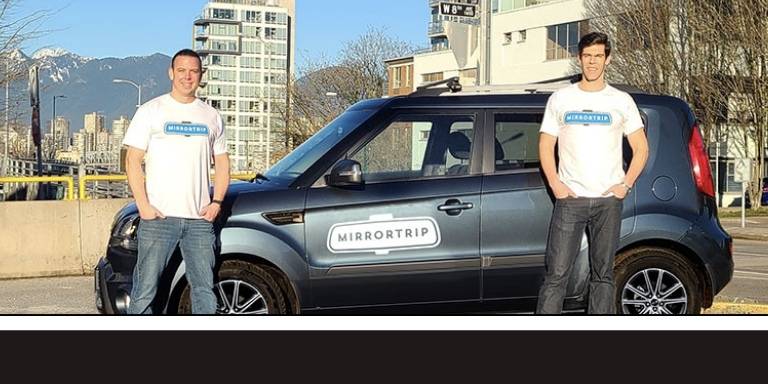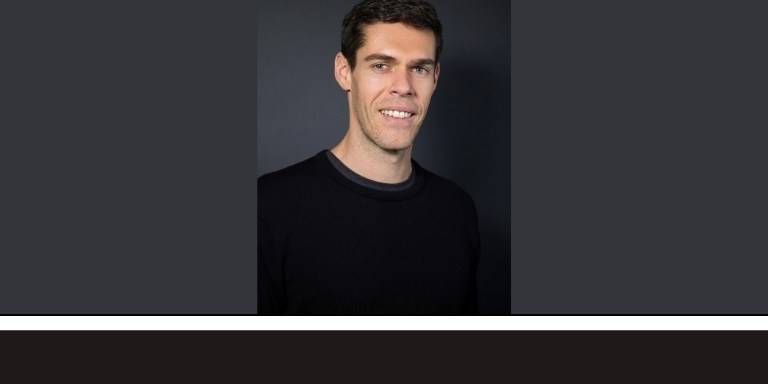Reece Griffin the founder of MirrorTrip is a graduate in Computer Science, and Commerce. New Zealand born and now based in Vancouver Canada. Reece is a veteran software developer and software team lead with a long background in digital healthcare and enterprise software consulting.
During his 2016 summer vacation to Europe, Reece found himself in a familiar situation – altering his travel plans to avoid the expensive one-way drop-off fees for rental cars. On the way back to Madrid, the penny dropped for the MirrorTrip idea. From here Reece co-founded MirrorTrip with his software colleagues back in Vancouver, forming MirrorTrip – a new car sharing concept called ‘ride switching’ that makes inter-city travel more affordable, and more enjoyable.
What is MirrorTrip all about?
MirrorTrip is all about streamlining the inter-city travel experience, both for travelers, and for fleet owners with the overall goal of reducing costs and improving flexibility. Getting cars back to their home city is a costly problem for rental companies. The rental companies pass this cost onto the consumer in the form of a drop-off fee.
MirrorTrip matches people driving in opposite directions so that they can avoid drop-off fees. For example, the first driver drives the car from Vancouver to Calgary, and when they’re finished with it, the second driver drives it back to Vancouver. We have deals in place with top tier rental providers like Hertz that allow us to operate like this.
Essentially, MirrorTrip is a new type of car sharing, one we call ‘ride switching’.
Tell us a little bit about your background and how you started your company?
I graduated with a Computer Science degree and a Commerce degree and have spent the last 15 years or so heavily involved in the software industry solving problems for some pretty big companies. It was during my summer vacation in Europe in 2016 when I had the breakthrough idea for MirrorTrip. I found myself in a familiar situation, altering my travel plans to avoid one-way drop-off fees. First, I wanted to confirm this was a problem that other people were facing. It was easy to verify the problem, because there were lots of blogs talking about the problem with hundreds of commiserations in the comments section of these blogs talking about their negative experiences with drop-off fees.
Given my background in software and problem solving & love of road trips, I was immediately interested solving this problem. When I got home, I convinced the co-owners of the digital agency that I manage to found a company with me so that I could leverage their complementary talents & resources in graphic design and branding.
What was the biggest problem you encountered with your business and how did you overcome it?
The first problem I had to solve was ‘why would a rental company allow me to use their cars like this rather than just do it themselves?’. Part of this is obvious, car rental is a mainstream industry, not a startup; people know how to do it already – why would a rental company take a risk on their own brand by thrusting some radical new concept into the forefront to confuse their service offering? Short answer, they probably wouldn’t. However, that still might not stop them from creating their own budget subsidiary brand to steal the MirrorTrip idea.
So, defensibility was top of mind. We took the software patent approach here. Performing our own check of patent databases showed us there was a potential opening here. Many concepts that are novel (haven’t been done before) and that have inventive and clearly defined parameters are eligible for patents & MirrorTrip checked these boxes – we filed for a global PCT patent which had all of its claims upheld & this gave us more of a level playing ground to start approaching rental companies.
The next question was – ‘How would this work in a way that rental companies could accommodate?’; e.g. Is it even possible within the world of car-rental? After lots of hypothetical conversations with rental desk staff about my hypothetical ‘friend’ in a different city we came to the realization that you can sign a second driver onto the contract anywhere.
E.g. if you picked up at Avis in LA and got tired of driving on the way to Seattle, you could sign your travelling companion onto the contract as a second driver at Avis in San Francisco. We thought this was a significant development (spoiler alert it wasn’t 🙂
What were the top mistakes you made starting your business and what did you learn from it?
The first mistake was slight. As mentioned above, we assumed that a mode of operations that was easy to accommodate by rental companies would be most appealing to them. E.g. if you just meet the other driver at the handoff location and sign them onto the contract as a second driver, then the rental companies wouldn’t have to change anything to accommodate us. Digging deeper, and during our negotiations with rental companies, we soon realized this could be legally complex. It’s generally fine for family, friends or people you trust. Strangers less so, if the second driver gave a false name, didn’t have insurance, and did something that required insurance, liability could fall back to the first driver. Ultimately it wasn’t a big deal, once rental companies became motivated to work with us, they provided work arounds to suit us, such as closing the contract altogether for the first driver & starting a new contract for the second driver. This also created an added bonus that both drivers don’t have to be in the same place at the same time, creating further flexibility and less waiting.
The second mistake was the build it and they will come approach (e.g. the opposite of the lean startup model). Even though I’m a huge fan of the lean model, we fell into a couple of bloated sub-executions. The first was assuming that we could use API providers to plug into rental company booking systems without even talking to them, after sinking hundreds of dev hours into complicated legacy travel booking system services, we realized the final requirement was a signature of approval from all rental companies you wish to work with. Then after gaining some signatures realizing those rental companies didn’t even necessarily want to use the API providers we chose. It was still worth looking into, but it set our launch date back at least a year.

What is one thing that you do daily to grow as an entrepreneur?
Staying up to date in a way that is multi-disciplinary as possible. Tech/Startup news, Tech / Startup channels (e.g. the types that announce new programs & opportunities), Industry-specific news (e.g. in my case travel/mobility), and PR
Continuously re-evaluating your opportunities. Don’t assume that one aspect of your service or website can’t be better, or that because you’ve tried it before that you shouldn’t try it again with a new angle. Pouring over analytics, and strategy blogs is a great way to re-evaluate this type of thing.
What are three books or courses you recommend for new entrepreneurs?
- Stanford startup series on YouTube
- Stripe Atlas. If you think you may want/need investors in the future and want a solid corporate platform to make yourself more appealing to them then this is worth a look. It also comes with a treasure trove of legal documents to help you assign shares, and employee people (among other things) the right way. It also comes with some nice perks such as discounts on web hosting and other services.
- Startup boost or another startup accelerator. There are lots of smart people looking to give back to the startup community. Outside input and investor connections is invaluable to refining your concept, communication, and growth strategy.
What is the one thing you wish you knew before starting your business?
If you’re asking Reece 20 years ago at my first startup; lots! Namely ‘how to start a business’ 😉
I’m pretty cautious though, like to do lots of research before diving in – so these days, not so much; no regrets! Perspective is huge, the only way you can get it is through experience.
What has been your most effective marketing strategy to grow your business?
Overall, SEO. If you don’t understand it, and you’re in an industry where people may feasibly be searching for what you are selling (or something like it) – then you need to understand it. It’s too big to leave out.
If you only had $1000 dollars to start a new startup, knowing everything you know now, how would you spend it?
I would try not to spend it at all. Put up a splash page on a cheap website that explains your concept and gives it some legitimacy, perhaps with a lead gen form. Then before you even try and build your startup see if you can sell it first. Start talking to people, see if they’ll actually buy it and if they like your idea. If you find enough of them, find someone else to give you $100k and then build it. This is the lean startup model.
What’s your best piece of advice for aspiring and new entrepreneurs?
Don’t try and pick arbitrary ideas to pursue (for the sake of it), solve something near and dear to you. If nothing jumps out, expose yourself to more varied professional and leisure activities until something comes along, you’ll know it when you see it (because you won’t be able to think of anything else!)
What is your favorite quote?
“If I had asked people what they wanted, they would have said faster horses.”
– Henry Ford
- HARO – Help a Report Out
- SEO
- Google Ads
How is running a tech company different than what you thought it would be?
From my background (technical), at a stage it becomes less about the technology. It can be tough to adopt this mindset especially if technology is your hero (as it is with me). The technology though simply needs to serve a purpose. The most important task for a startup CEO is to own the sales funnel: know your customers, know how to reach them and what makes them tick. Once you’ve figured that out you can scale through more traditional sales and marketing channels. Product, of course, is important, but it’s a given – you need it anyways.
How can readers get in touch with you?
If there’s a good reason to connect – feel free to ping me on LinkedIn
Tech Founder Interview: 5 Questions: Andrew Filev Founder of Wrike








